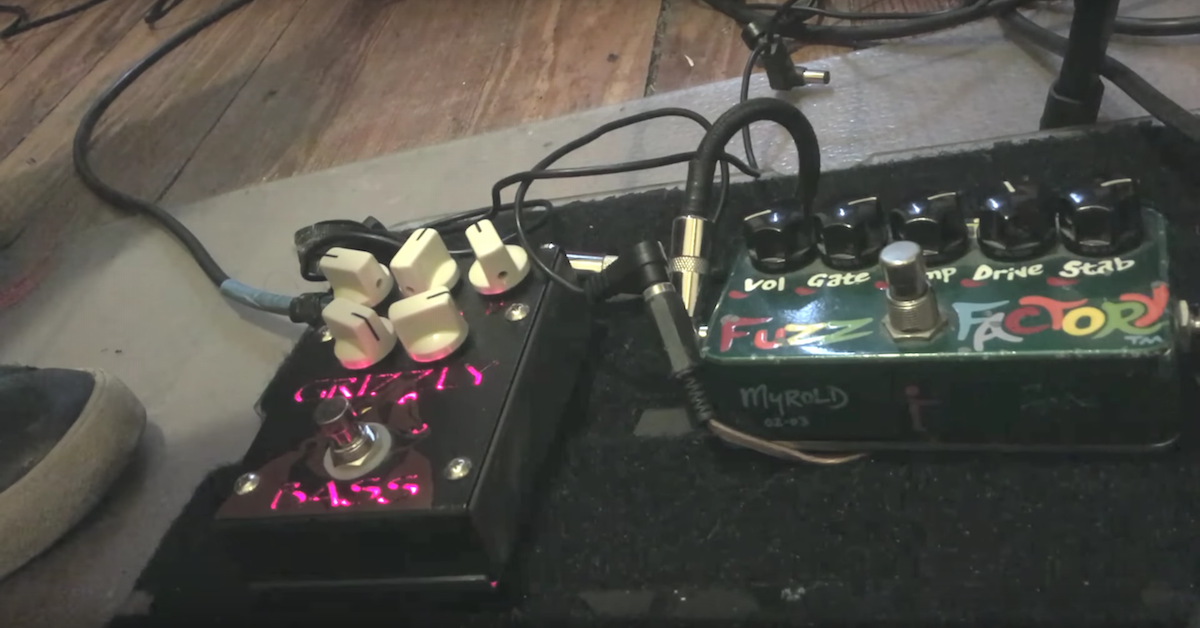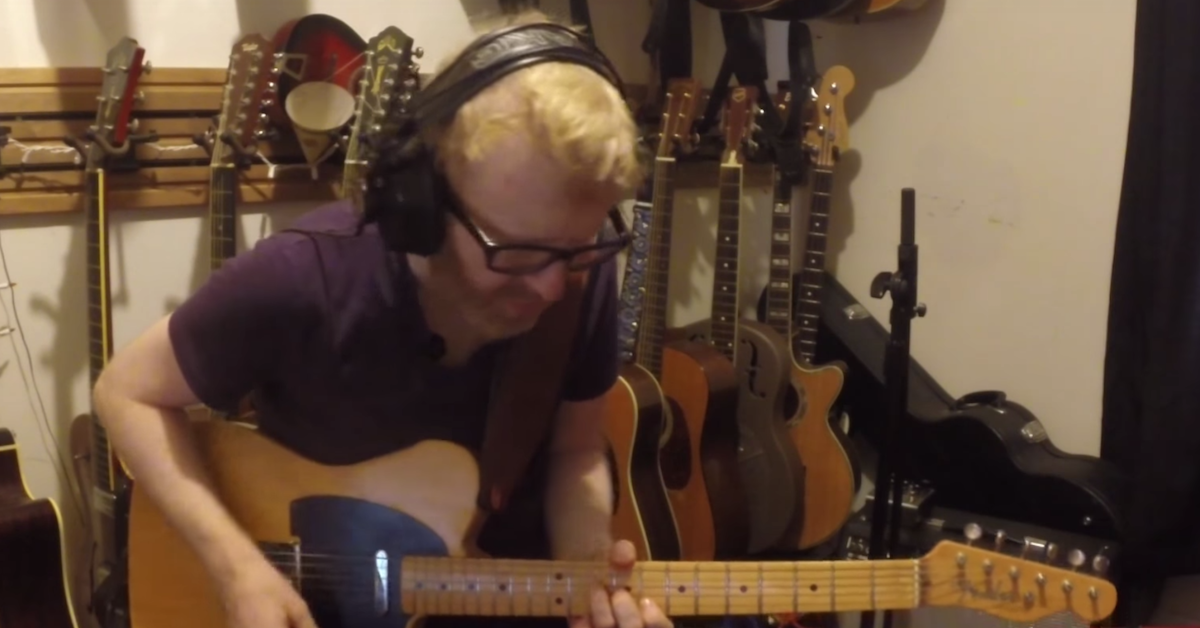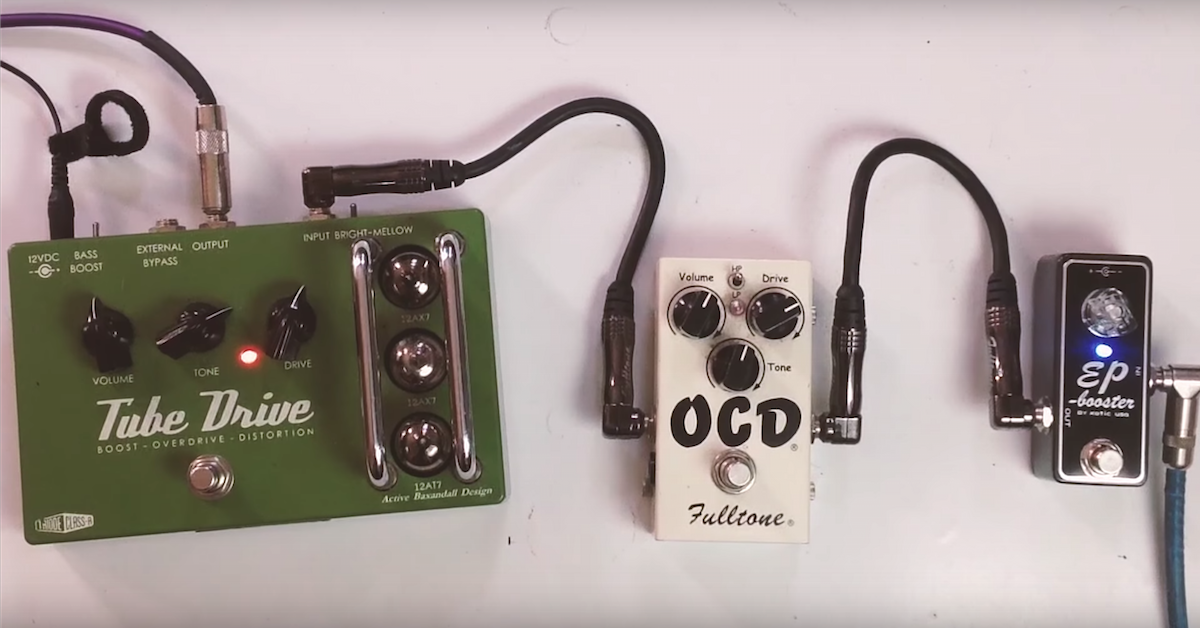3 Categories of Guitar Pedals for Recording Sessions
Article Content
1. Overdrive
Guitarists can be really picky about which overdrive pedal is their main squeeze. Everyone has a different preference.
Even though you may have your go-to, it’s a good idea to have several options for a session. If you’re going to be recording layers of guitar tracks it really helps to have variables.
Guitars with duplicate sounds are going to stack up the same frequencies. This can make it harder to mix. If each part has a slightly different DNA it will ease your plugin count.
When I go to a session, I take 3-4 overdrive pedals and a fuzz. You can pick your own Overdrive Cocktail.
I break them down into five categories: Bottom, Mid, Top, Flava, and Trippy.
Here is what my regular choices are in these categories:
Bottom
Effectrode TubeDrive — this pedal really does sound like a real tube amp when it starts to break up. The low end isn’t chopped off and there isn’t a mid boost. It’s also less compressed like a lot of other overdrive pedals.
Mid
Klon KTR — this is a very mid-heavy pedal. The low end is attenuated and there is some compression happening. It’s a slightly different mid-boost than a Tube Screamer.
High
Creation Audio Holy Fire — this doubles as an overdrive/distortion and is very transparent. If I wanted some sparkle and drive without messing with my core tone, this is the one.
Flava
Fulltone OCD — this pedal definitely falls into the colored overdrive pedal family. It’s a little more in the Marshall family. More gain than the KTR with more low-mid accents.
It’s always good to have one or two overdrive pedals that aren’t transparent. Especially if you have to track all the parts with one amp.
Even if I use the same guitar, the difference between these sounds will be noticeable.
Trippy
I find that I can get away with one fuzz pedal per session. I have a collection of them, but for an all-purpose fuzz, I use a Tonebender MKII. It’s pretty much the classic Jimmy Page tone. It’s more versatile than most fuzz pedals.
It’s rare that I have to get super weird on a session. I generally only swap out the fuzz if I need to go far out.
2. Delay
I often take more than one delay to a session. I have three that are my main homies.
Fulltone Tube Tape Echo — I love this thing not only for its tape delay, but as a tube preamp. I usually only bring this one on songwriter records because of its size. On the cork sniffer sessions, you can really hear the difference of a real tape echo.
Strymon El Capistan (tape delay emulation that does some cool things that a real tape echo can’t do with real-time tape manipulation).
MIDI Sync
Commercial sessions move fast. The more you can commit to a sound, the faster mixing gets done. This is partly due to the fast turnaround.
Guitarists know their sounds. What could take an engineer 15 minutes to set up, a guitarist can nail in 1 minute.
This is especially the case with delays. The only complaint from engineers about using guitar pedals is tempo sync. Some engineers like to have delays locked down with the song.
Sure you can use tap tempo, but it’s not the same. For this reason I always take a Pigtronix Echolution.
The Echolution accepts MIDI Beat Clock. That means it reads the tempo from Pro Tools! It’s like using a plugin at your feet. Tempo and delay perfectly synced!
The advantages of using a pedal versus a plugin? The guitarist can manipulate the delay in real time. Also, the pedal sounds better in my opinion.
I’m still not in love with any delay plugins for guitar delay manipulation.
There are a lot of sounds I know how to pull out of the Echolution quickly with high-quality results. Time is a premium in commercial sessions.
Note: always remember to take a long MIDI cable with you. Not a bad idea to take a small USB midi interface as well.
There are a lot of delays out there to choose from. I’m still collecting. Not all accept MIDI Beat Clock.
3. Modulation
I think of modulation in 4 ways: Tremolo, Chorus, Uni-Vibe, and Leslie.
Leslie
In a pinch, you can fake a Leslie sound from a chorus pedal. But, for a serious session, I may want something more authentic. There are a couple of companies such as Strymon making nice sounding Leslie pedals. Personally, I use the Hughes and Kettner Tube Rotosphere.
Tremolo
A lot of vintage amps have tremolo. But, you never know what the studio is going to have upon your arrival unless you chat with the engineer first (always do this when you can).
When in doubt, I always bring my Fulltone Supa Trem as a backup. Tremolo has been a touchy thing with me; more so than a lot of other pedals. Some sound very generic and dull to my ears. The Supa Trem and the Diaz Tremodillo sounds very authentic to me. Different folks, different strokes. You may have your own preferences. I encourage you to experiment.
Uni-Vibe
A Uni-vibe isn’t the same as a Leslie, although its invention was meant to be a substitute. If I have space to bring more pedals on a gig, I’ll pack my Fulltone Mini Deja Vibe. I like it because it doesn’t sound dead like some others.
Chorus
It doesn’t get called out very often, but when it does it’s absolutely perfect because it’s such a specific sound.
A dab of chorus can be a really nice thing. In a pinch, I can use my El Capistan to create a chorus set on a short delay with no feedback.
I always ask what the vibe of a session is before I pack. If there is any hint of 80s vibe, my TC Corona Chorus goes in the bag. The old Boss Chorus pedals are a classic sound as well.
There are quite a few good options with chorus pedals.
Conclusion
I’m out of words and I haven’t even covered reverb. I don’t bring a lot of reverbs to sessions as I find it’s often best left to the mix engineer.
What do you always bring to a session?





